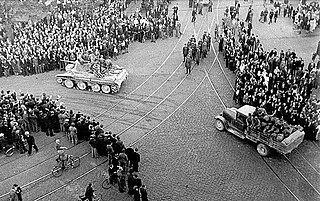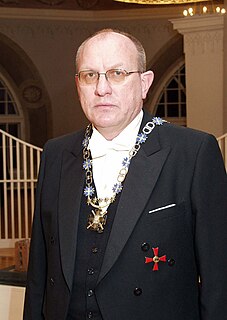
The University of Tartu is a university in the city of Tartu in Estonia. It is the national university of Estonia. It is the only classical university in the country, and also its biggest and most prestigious university. It was founded under the name of Academia Gustaviana in 1632 by Baron Johan Skytte, the Governor-General (1629–1634) of Swedish Livonia, Ingria, and Karelia, with the required ratification provided by his long-time friend and former student – from age 7 –, King Gustavus Adolphus, shortly before the king's death on 6 November in the Battle of Lützen (1632), during the Thirty Years' War (1618–1648).

Johann Philipp Gustav von Ewers or Evers was a German legal historian and the founder of Russian legal history as a scholarly discipline.

Konstantin Päts was an Estonian statesman and the country's President in 1938–1940. Päts was one of the most influential politicians of independent Estonia, and during the two decades prior to World War II he also served five times as the country's Prime Minister.
Joachim Hoffmann was a German historian who was the academic director of the German Armed Forces Military History Research Office.

The Holocaust in Estonia refers to the Nazi crimes during the 1941-1944 occupation of Estonia by Nazi Germany.

Georg Julius von Schultz, also known under his pseudonym Dr. Bertram, was a prominent Estophile of Baltic German heritage. A friend of Friedrich Reinhold Kreutzwald, he was instrumental in the latter's decision to develop Kalevipoeg.

The Soviet occupation of Latvia in 1940 refers to the military occupation of the Republic of Latvia by the Soviet Union under the provisions of the 1939 Molotov–Ribbentrop Pact with Nazi Germany and its Secret Additional Protocol signed in August 1939. The occupation took place according to the European Court of Human Rights, the Government of Latvia, the United States Department of State, and the European Union. In 1989, the USSR also condemned the 1939 secret protocol between Nazi Germany and herself that had led to the invasion and occupation of the three Baltic countries, including Latvia.
Norbert Angermann is a German historian.

The Soviet re-occupation of Latvia in 1944 refers to the military occupation of Latvia by the Soviet Union in 1944. During World War II Latvia was first occupied by the Soviet Union in June 1940 and then was occupied by Nazi Germany in 1941–1944 after which it was re-occupied by the Soviet Union.

Relevant events began regarding the Baltic states and the Soviet Union when, following Bolshevist Russia's conflict with the Baltic states—Lithuania, Latvia and Estonia—several peace treaties were signed with Russia and its successor, the Soviet Union. In the late 1920s and early 1930s, the Soviet Union and all three Baltic States further signed non-aggression treaties. The Soviet Union also confirmed that it would adhere to the Kellogg–Briand Pact with regard to its neighbors, including Estonia and Latvia, and entered into a convention defining "aggression" that included all three Baltic countries.

Peeter Järvelaid is an Estonian legal scholar and historian. Järvelaid is a professor in the University of Tallinn. He has developed semiotic and personality-centered research direction, writing hundreds of articles mostly about the European and Estonian legal history and education, published in Estonian, English, German, French, Russian, Latvian, Finnish, Lithuanian and Swedish. Since 2006 his studies have been increasingly concentrated on the international relations in the 20th century, which among others has required intensive archival researches in German and Polish archives. Since 2012 Järvelaid has placed his research emphasis on the German diplomatic missions, with a specific interest in German diplomatic representation in Tallinn.

Egils Levits is a Latvian politician, lawyer, political scientist and jurist who has served as the tenth president of Latvia since 8 July 2019. He was a member of the European Court of Justice from 2004 to 2019.

Riho Terras is an Estonian politician and a former military officer who is serving as a member of the European Parliament since 1 February 2020. He was the Commander of the Estonian Defence Forces from 2011 to 2018. He was promoted to general in 2017.
Eduard Otto Emil Karl Adam Freiherr von Stackelberg was an Estonian chemist, landowner and politician who belonged to the Stackelberg family. As a chemist, he proposed a model for the periodic table in 1911. He was among the Baltic German landowners deported to Siberia, first by the Tsarist authorities and later by the Bolsheviks. Following World War I he lived in Germany. In 1927 he published a memoir.

Ewald Ammende was an Estonian journalist, human rights activist and politician of Baltic German origin.

Skandinavskii sbornik, also Скандинавский сборник, Skandinaavia kogumik, and Skrifter om Skandinavien, was an annual serial publication of the history and wider humanities in Scandinavia and the Baltic. It was published by the University of Tartu in Estonia between 1956 and 1990 and has been described as the principal forum for scholars of Nordic studies in the Soviet region. It emphasised long-term trends over short-term events and had a philosophy that peaceful coexistence between nations and peoples was the most natural order of things. It ceased publication following the collapse of the Soviet Union.

Karin Luts was considered the leading Estonian female painter and a graphic artist.
Jan C. Behrends is a German historian, who is known for his research on Stalinism, propaganda, public discourse, violence and wars in the Soviet and post-Soviet space. He is regarded as a leading expert on the history of Soviet and Russian security services. He is a senior researcher at the Centre for Contemporary History, and formerly worked at the WZB Berlin Social Science Center.

The Summer War was the occupation of Estonia during the Second World War. It was fought between the Forest Brothers (Metsavennad), the Omakaitse, and the Wehrmacht's 18th Army against the forces of the 8th Army of the USSR and the NKVD.

Friedrich Niggol was an Estonian lawyer and politician.
















